外研版(2019)必修 第二册Unit 3 On the move课件(共20张PPT)
文档属性
| 名称 | 外研版(2019)必修 第二册Unit 3 On the move课件(共20张PPT) |  | |
| 格式 | pptx | ||
| 文件大小 | 3.0MB | ||
| 资源类型 | 教案 | ||
| 版本资源 | 外研版(2019) | ||
| 科目 | 英语 | ||
| 更新时间 | 2023-10-25 19:49:50 | ||
图片预览

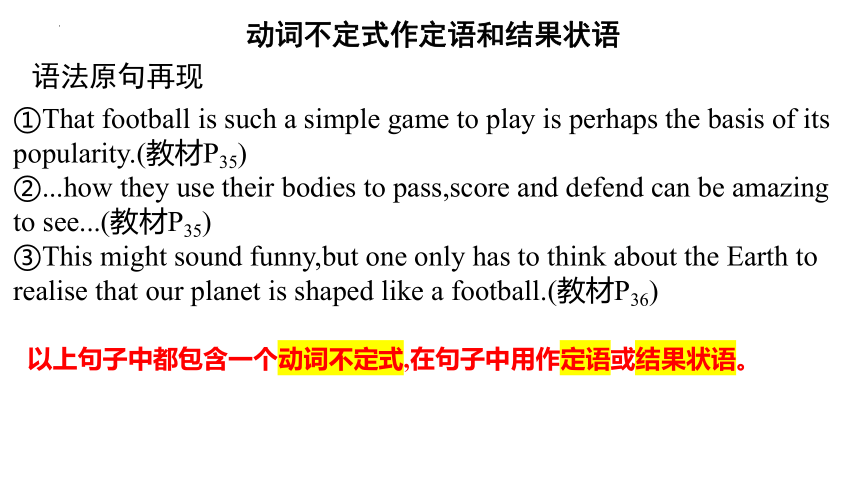
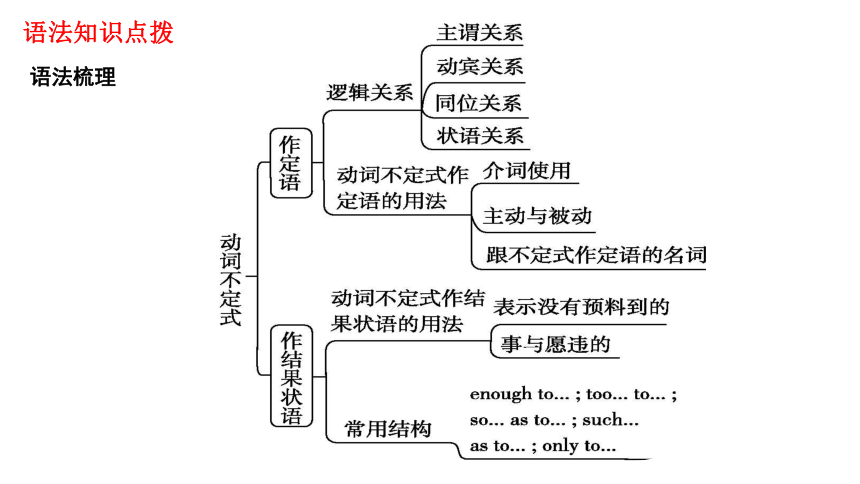
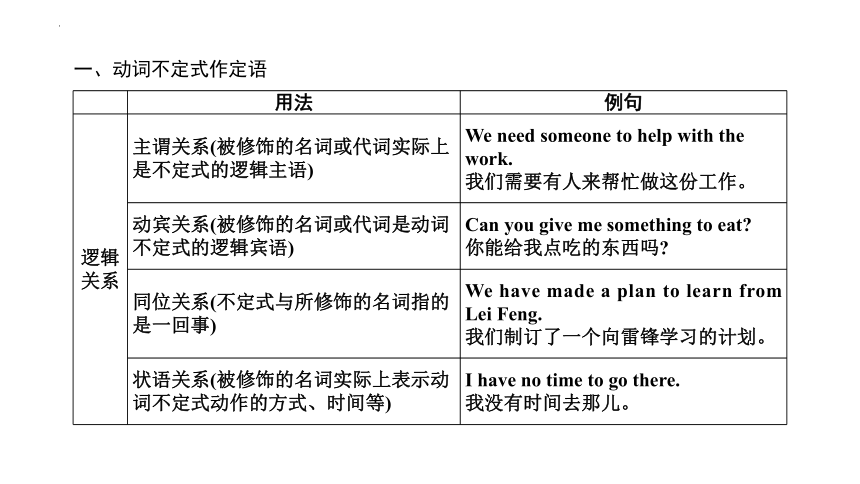
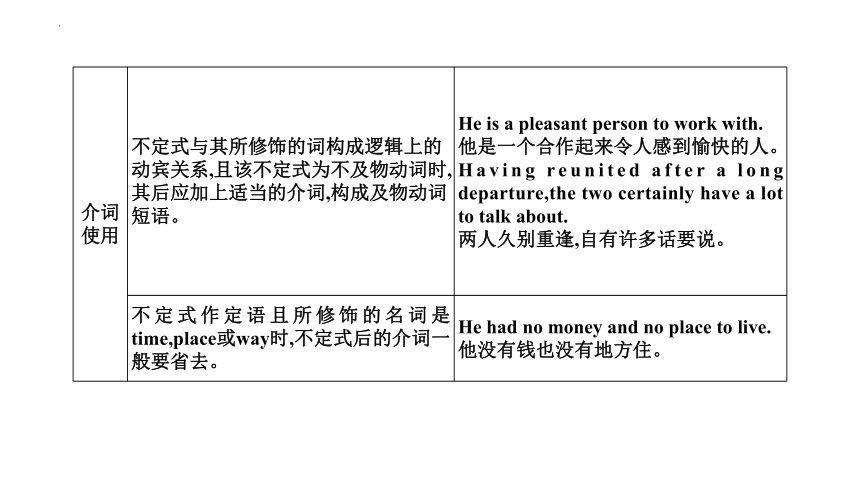
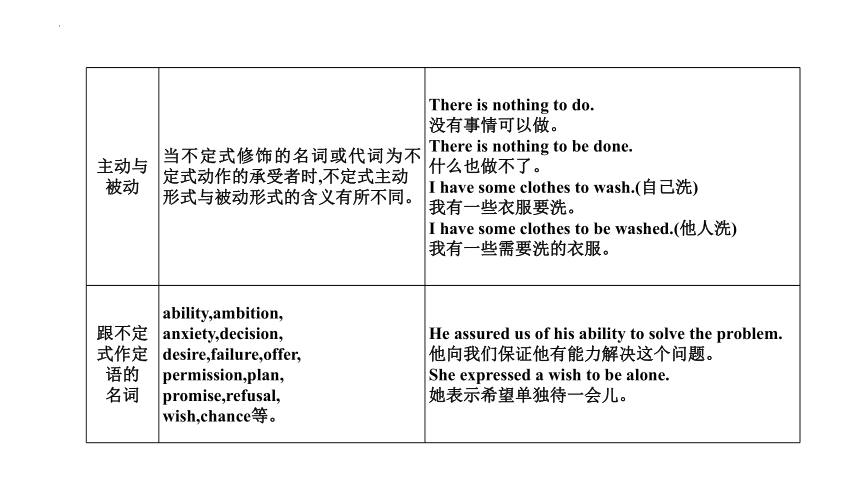
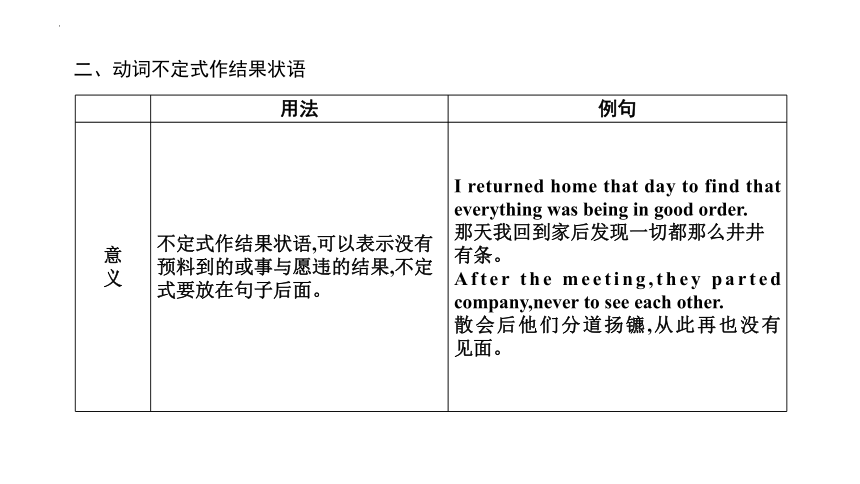


文档简介
(共20张PPT)
Grammar
动词不定式作定语和结果状语
Unit 3 On the move
动词不定式作定语和结果状语
语法原句再现
①That football is such a simple game to play is perhaps the basis of its popularity.(教材P35)
②...how they use their bodies to pass,score and defend can be amazing to see...(教材P35)
③This might sound funny,but one only has to think about the Earth to realise that our planet is shaped like a football.(教材P36)
以上句子中都包含一个动词不定式,在句子中用作定语或结果状语。
语法知识点拨
语法梳理
一、动词不定式作定语
用法 例句
逻辑关系 主谓关系(被修饰的名词或代词实际上是不定式的逻辑主语) We need someone to help with the work.
我们需要有人来帮忙做这份工作。
动宾关系(被修饰的名词或代词是动词不定式的逻辑宾语) Can you give me something to eat
你能给我点吃的东西吗
同位关系(不定式与所修饰的名词指的是一回事) We have made a plan to learn from Lei Feng.
我们制订了一个向雷锋学习的计划。
状语关系(被修饰的名词实际上表示动词不定式动作的方式、时间等) I have no time to go there.
我没有时间去那儿。
介词使用 不定式与其所修饰的词构成逻辑上的动宾关系,且该不定式为不及物动词时,其后应加上适当的介词,构成及物动词短语。 He is a pleasant person to work with.
他是一个合作起来令人感到愉快的人。
Having reunited after a long
departure,the two certainly have a lot to talk about.
两人久别重逢,自有许多话要说。
不定式作定语且所修饰的名词是time,place或way时,不定式后的介词一般要省去。 He had no money and no place to live.
他没有钱也没有地方住。
主动与被动 当不定式修饰的名词或代词为不定式动作的承受者时,不定式主动 形式与被动形式的含义有所不同。 There is nothing to do.
没有事情可以做。
There is nothing to be done.
什么也做不了。
I have some clothes to wash.(自己洗)
我有一些衣服要洗。
I have some clothes to be washed.(他人洗)
我有一些需要洗的衣服。
跟不定式作定语的 名词 ability,ambition, anxiety,decision, desire,failure,offer, permission,plan, promise,refusal, wish,chance等。 He assured us of his ability to solve the problem.
他向我们保证他有能力解决这个问题。
She expressed a wish to be alone.
她表示希望单独待一会儿。
二、动词不定式作结果状语
用法 例句
意 义 不定式作结果状语,可以表示没有预料到的或事与愿违的结果,不定式要放在句子后面。 I returned home that day to find that everything was being in good order.
那天我回到家后发现一切都那么井井有条。
After the meeting,they parted company,never to see each other.
散会后他们分道扬镳,从此再也没有
见面。
常 用 结 构 enough to... She was brave enough to go there alone.
她足够勇敢独自到那里去。
too...to... They were too excited to say a word.
他们太激动了,以至于一句话也说不出来。
so...as to... Yesterday morning I got up so late as to be late for school.
昨天早晨我起得那么晚,以至于上学都迟到了。
such... as to... We are not such fools as to believe that.
我们不是那样的蠢人,竟会相信那件事。
only to... They lifted a stone only to drop it on their own feet.
他们搬起石头却砸了自己的脚。
不定式作结果状语
1. 不定式做结果状语,常与learn, find, see, hear, make等动词连用。
He returned home to learn his daughter had just been engaged.
他回家后得知女儿刚刚订婚了。
2. only+不定式,常常表示出乎意料的结果。例如:
I hurried to Professor Wang's house only to find he was out.
我匆忙赶到王教授家,却发现他外出了。
3. so/ such... as to可作结果状语。例如:
She was so angry as to be unable to speak. 她气得连话都说不出来。
4. enough后面加不定式作结果状语。
This room is large enough to place a third bed. 房间足够大,可以再放一张床。
5. too...to结构中,也是不定式作结果状语。
He is too young to get dressed. 他太小了还不会穿衣服。
不定式做结果状语常用结构 enough to... She was brave enough to go there alone. 她有足够的勇气独自到那里去。
too...to... They were too excited to say a word.
他们太激动了,以至于一句话也说不出来了。
so...as to... Yesterday morning I got up so late as to be late for school. 昨天早晨我起得那么晚,以至于上学都迟到了。
such...as to... We are not such fools as to believe that.我们不是那样的傻子,竟会相信那件事。
only to... (常表示出乎意料的结果) They lifted a stone only to drop it on their own feet.
他们搬起石头, 却砸了自己的脚。
1.Sorry,sir.I have no time (visit) your company today.
2.He went to the kitchen (find) something to eat.
3.Julia is a pleasant girl (work) with.
4.It’s so cold here. I think there is nothing (do) in such weather.
5.I believe in his ability (solve) the problem.
to visit
to find
to work
to be done
to solve
6.As old friends, we certainly have a lot (talk) about at the
party.
7.She hurried to the cinema, only (tell) that the tickets had
been sold out.
8.Mary was brave enough (work) there alone.
9.The ability (express) an idea is as important as the idea
itself.
10.I think this room is the best place (study) in.
to talk
to be told
to work
to express
to study
04
Exercise
语境运用
完成句子
①We find he is not the right person (一起共事).
②He has made a plan (帮助同学).
③She rushed home, (却发现) everything was gone.
④Is the little girl (足够勇敢) to go home alone at night
to work with
to help classmates
only to find
brave enough
真题赏析
1.The researchers then tested the dogs’ ability (distinguish) between human facial expressions by showing them the other half of the person’s face or images totally different from the ones used in training.(2021浙江6月,阅读理解C)
to distinguish
答案及剖析:
1.to distinguish 考查非谓语动词。名词 ability 意为“能力”,为抽象名词,后接不定式作定语。
2.Lamb and mother reunited,I turned back to the tractor only ____________.(see) it move suddenly away from me.(2020浙江7月,完形填空)
to see
答案及剖析:
2.to see 考查非谓语动词。“only to do”表示出乎意料的结果。
3.The median (中位数) age of an American in 1950 was 30—today it is 41 and is expected (increase) to 42 by 2050.
(2020浙江1月,语法填空)
to increase
答案及剖析:
3.to increase 考查非谓语动词。根据“is expected”可知,其后应用不定式,意为“预计将……”。
课文语法填空
The history of football 1. (go) back over two thousand years to Ancient China, when it was known 2. cuju. It was a game 3. (use) a ball of animal skins with hair inside,4. goals were hung in the air. Later, modern football started in Great Britain, where new rules were made.
Football is simple and very cheap to play, which 5. (be) perhaps the basis of its popularity. People don’t need expensive 6. (equip) and the football doesn’t cost much money. Besides, another factor behind its global popularity is the creativity and excitement on 7. field. It is 8. .
(attract) to millions of people. People can see children playing to 9. .
(they) hearts’ content with a ball everywhere. What’s more, it has become one of the best ways for people 10. (communicate).It breaks down walls and brings people together on and off the field.
goes
as
using
whose
is
equipment
the
attractive
their
to communicate
Grammar
动词不定式作定语和结果状语
Unit 3 On the move
动词不定式作定语和结果状语
语法原句再现
①That football is such a simple game to play is perhaps the basis of its popularity.(教材P35)
②...how they use their bodies to pass,score and defend can be amazing to see...(教材P35)
③This might sound funny,but one only has to think about the Earth to realise that our planet is shaped like a football.(教材P36)
以上句子中都包含一个动词不定式,在句子中用作定语或结果状语。
语法知识点拨
语法梳理
一、动词不定式作定语
用法 例句
逻辑关系 主谓关系(被修饰的名词或代词实际上是不定式的逻辑主语) We need someone to help with the work.
我们需要有人来帮忙做这份工作。
动宾关系(被修饰的名词或代词是动词不定式的逻辑宾语) Can you give me something to eat
你能给我点吃的东西吗
同位关系(不定式与所修饰的名词指的是一回事) We have made a plan to learn from Lei Feng.
我们制订了一个向雷锋学习的计划。
状语关系(被修饰的名词实际上表示动词不定式动作的方式、时间等) I have no time to go there.
我没有时间去那儿。
介词使用 不定式与其所修饰的词构成逻辑上的动宾关系,且该不定式为不及物动词时,其后应加上适当的介词,构成及物动词短语。 He is a pleasant person to work with.
他是一个合作起来令人感到愉快的人。
Having reunited after a long
departure,the two certainly have a lot to talk about.
两人久别重逢,自有许多话要说。
不定式作定语且所修饰的名词是time,place或way时,不定式后的介词一般要省去。 He had no money and no place to live.
他没有钱也没有地方住。
主动与被动 当不定式修饰的名词或代词为不定式动作的承受者时,不定式主动 形式与被动形式的含义有所不同。 There is nothing to do.
没有事情可以做。
There is nothing to be done.
什么也做不了。
I have some clothes to wash.(自己洗)
我有一些衣服要洗。
I have some clothes to be washed.(他人洗)
我有一些需要洗的衣服。
跟不定式作定语的 名词 ability,ambition, anxiety,decision, desire,failure,offer, permission,plan, promise,refusal, wish,chance等。 He assured us of his ability to solve the problem.
他向我们保证他有能力解决这个问题。
She expressed a wish to be alone.
她表示希望单独待一会儿。
二、动词不定式作结果状语
用法 例句
意 义 不定式作结果状语,可以表示没有预料到的或事与愿违的结果,不定式要放在句子后面。 I returned home that day to find that everything was being in good order.
那天我回到家后发现一切都那么井井有条。
After the meeting,they parted company,never to see each other.
散会后他们分道扬镳,从此再也没有
见面。
常 用 结 构 enough to... She was brave enough to go there alone.
她足够勇敢独自到那里去。
too...to... They were too excited to say a word.
他们太激动了,以至于一句话也说不出来。
so...as to... Yesterday morning I got up so late as to be late for school.
昨天早晨我起得那么晚,以至于上学都迟到了。
such... as to... We are not such fools as to believe that.
我们不是那样的蠢人,竟会相信那件事。
only to... They lifted a stone only to drop it on their own feet.
他们搬起石头却砸了自己的脚。
不定式作结果状语
1. 不定式做结果状语,常与learn, find, see, hear, make等动词连用。
He returned home to learn his daughter had just been engaged.
他回家后得知女儿刚刚订婚了。
2. only+不定式,常常表示出乎意料的结果。例如:
I hurried to Professor Wang's house only to find he was out.
我匆忙赶到王教授家,却发现他外出了。
3. so/ such... as to可作结果状语。例如:
She was so angry as to be unable to speak. 她气得连话都说不出来。
4. enough后面加不定式作结果状语。
This room is large enough to place a third bed. 房间足够大,可以再放一张床。
5. too...to结构中,也是不定式作结果状语。
He is too young to get dressed. 他太小了还不会穿衣服。
不定式做结果状语常用结构 enough to... She was brave enough to go there alone. 她有足够的勇气独自到那里去。
too...to... They were too excited to say a word.
他们太激动了,以至于一句话也说不出来了。
so...as to... Yesterday morning I got up so late as to be late for school. 昨天早晨我起得那么晚,以至于上学都迟到了。
such...as to... We are not such fools as to believe that.我们不是那样的傻子,竟会相信那件事。
only to... (常表示出乎意料的结果) They lifted a stone only to drop it on their own feet.
他们搬起石头, 却砸了自己的脚。
1.Sorry,sir.I have no time (visit) your company today.
2.He went to the kitchen (find) something to eat.
3.Julia is a pleasant girl (work) with.
4.It’s so cold here. I think there is nothing (do) in such weather.
5.I believe in his ability (solve) the problem.
to visit
to find
to work
to be done
to solve
6.As old friends, we certainly have a lot (talk) about at the
party.
7.She hurried to the cinema, only (tell) that the tickets had
been sold out.
8.Mary was brave enough (work) there alone.
9.The ability (express) an idea is as important as the idea
itself.
10.I think this room is the best place (study) in.
to talk
to be told
to work
to express
to study
04
Exercise
语境运用
完成句子
①We find he is not the right person (一起共事).
②He has made a plan (帮助同学).
③She rushed home, (却发现) everything was gone.
④Is the little girl (足够勇敢) to go home alone at night
to work with
to help classmates
only to find
brave enough
真题赏析
1.The researchers then tested the dogs’ ability (distinguish) between human facial expressions by showing them the other half of the person’s face or images totally different from the ones used in training.(2021浙江6月,阅读理解C)
to distinguish
答案及剖析:
1.to distinguish 考查非谓语动词。名词 ability 意为“能力”,为抽象名词,后接不定式作定语。
2.Lamb and mother reunited,I turned back to the tractor only ____________.(see) it move suddenly away from me.(2020浙江7月,完形填空)
to see
答案及剖析:
2.to see 考查非谓语动词。“only to do”表示出乎意料的结果。
3.The median (中位数) age of an American in 1950 was 30—today it is 41 and is expected (increase) to 42 by 2050.
(2020浙江1月,语法填空)
to increase
答案及剖析:
3.to increase 考查非谓语动词。根据“is expected”可知,其后应用不定式,意为“预计将……”。
课文语法填空
The history of football 1. (go) back over two thousand years to Ancient China, when it was known 2. cuju. It was a game 3. (use) a ball of animal skins with hair inside,4. goals were hung in the air. Later, modern football started in Great Britain, where new rules were made.
Football is simple and very cheap to play, which 5. (be) perhaps the basis of its popularity. People don’t need expensive 6. (equip) and the football doesn’t cost much money. Besides, another factor behind its global popularity is the creativity and excitement on 7. field. It is 8. .
(attract) to millions of people. People can see children playing to 9. .
(they) hearts’ content with a ball everywhere. What’s more, it has become one of the best ways for people 10. (communicate).It breaks down walls and brings people together on and off the field.
goes
as
using
whose
is
equipment
the
attractive
their
to communicate
